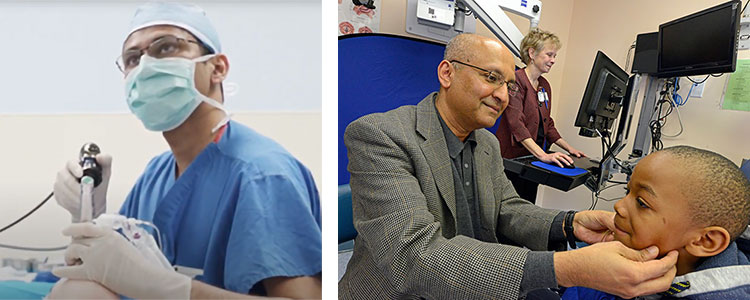Exploring the Area of Otolaryngology: What to Anticipate When You Speak With an ENT
Otolaryngology, generally described as ENT, includes the medical diagnosis and therapy of nose, ear, and throat disorders. For those experiencing associated issues, getting in touch with an ENT professional can give clearness and relief. Understanding what to anticipate during such consultations is important for effective communication and treatment. This introduction will certainly lay out crucial facets of the ENT experience, including typical factors for check outs and the processes associated with diagnosis and treatment.

Recognizing Otolaryngology: An Introduction
Otolaryngology, frequently described as ENT (Nose, throat, and ear) medication, is a customized branch of medication that focuses on the medical diagnosis and therapy of problems impacting these crucial locations of the human body. This area incorporates a large range of problems, consisting of those associated to hearing, equilibrium, respiratory system function, and speech. Otolaryngologists are educated to manage both medical and medical treatments, making use of sophisticated methods and technologies. Their expertise expands beyond standard disorders, addressing problems such as allergic reactions, sinus infections, and hearing loss. Additionally, they play a vital duty in the monitoring of head and neck cancers cells, giving extensive treatment customized to specific person needs. On the whole, otolaryngology stays vital for maintaining health and wellness and lifestyle in affected people.
Typical Factors to See an ENT Professional
Many individuals look for the know-how of an ENT professional for a variety of factors, showing the diverse nature of conditions that impact the ear, nose, and throat. Typical concerns consist of persistent sinus problems, which usually leads to relentless nasal congestion and facial discomfort. Allergic reactions and their connected signs and symptoms, such as itching and sneezing, also motivate check outs to these professionals (ENT). Hearing loss, whether abrupt or steady, is one more significant reason for assessment. On top of that, individuals may look for assessment for throat problems, including persistent hoarseness or swallowing difficulties. Rest apnea, characterized by disrupted breathing during sleep, is frequently attended to by ENT professionals too. Each of these problems highlights the significance of specialized care in managing intricate ENT-related wellness concerns
Getting ready for Your ENT Appointment
When planning for an ENT consultation, it is vital to gather relevant details and take into consideration any kind of certain worries. Clients need to put together a comprehensive case history, consisting of previous ear, nose, or throat concerns, surgical treatments, and current drugs. Documenting symptoms-- such as extent, regularity, and period-- can give valuable insights for the ENT specialist. Furthermore, people ought to prepare a list of concerns they desire to ask, making sure that all worries are addressed throughout the visit. Bringing along any pertinent medical records or test results can even more help the ENT in recognizing the person's condition. Lastly, individuals must confirm their visit details, including day, time, and place, to lessen any type of final complication. Correct prep work can enhance the efficiency of the assessment and result in better results.
What to Anticipate During the Assessment
As the examination starts, the client can anticipate to participate in an extensive discussion with the ENT specialist concerning their symptoms and medical history. The professional will certainly ask about the period, regularity, and extent of signs and symptoms such as hearing loss, nasal blockage, or sore throat. Furthermore, the client's previous medical problems, drugs, and any appropriate family history will be examined, assisting the professional my review here in developing a total understanding of the individual's health. The ENT may likewise ask regarding way of life factors, such as direct exposure to allergens or irritants. This open discussion establishes a structure for the examination, guaranteeing that the patient's problems are addressed and establishing the phase for any kind of essential analyses or suggestions for therapy.
Analysis Examinations and Treatments in Otolaryngology
A variety of diagnostic examinations and procedures are vital in otolaryngology to precisely evaluate and identify conditions impacting the ear, nose, and throat. Common examinations include audiometry, which measures hearing feature, and tympanometry, evaluating middle ear pressure. Nasal endoscopy permits visualization of the nasal flows and sinuses, while laryngoscopy analyzes the throat and vocal cables. Imaging methods, such as CT scans and MRIs, offer in-depth sights of head and neck frameworks. Allergy screening may also be performed to identify triggers for sinus or respiratory issues. These diagnostic tools allow ENT professionals to develop a comprehensive understanding of patients' conditions, making certain tailored and reliable monitoring strategies. Proper diagnosis is necessary for successful treatment results in otolaryngology.
Treatment Choices Provided by ENT Specialists
ENT specialists offer a range of treatment options customized to resolve details problems influencing the ear, nose, and throat. These treatments vary from traditional approaches, such as medication and way of living alterations, to even more invasive treatments. For example, allergic reactions might be managed with antihistamines or immunotherapy, while chronic sinusitis might require nasal corticosteroids or sinus surgery. For hearing loss, ENT specialists commonly suggest listening devices or medical treatments like cochlear implants. In instances of throat disorders, options can include speech therapy or surgeries to get rid of obstructions. Additionally, they may offer assistance for handling sleep apnea, including the use of CPAP devices or medical interventions. On the whole, the objective is to boost individuals' lifestyle with personalized treatment and effective treatment approaches.
When to Look For Follow-Up Care With an ENT
When to seek follow-up treatment with an ENT specialist is essential for taking care of ongoing symptoms or issues related to ear, throat, and nose conditions, recognizing. Clients need to battaglia ent think about setting up a follow-up consultation if symptoms persist in spite of first treatment, such as persistent ear pain, nasal congestion, or throat pain. Adjustments in hearing, equilibrium issues, or unusual nasal discharge might additionally necessitate further analysis. In addition, if a client experiences side impacts from suggested drugs or has undertaken a surgical procedure, follow-up care is crucial to check recovery and deal with any kind of concerns. Timely appointments can assure reliable management of conditions, avoid potential issues, and give assurance pertaining to one's health and wellness. Seeking follow-up treatment advertises positive health and wellness management in otolaryngology.
Often Asked Concerns

What Certifications Should I Look for in an ENT Expert?
When seeking an ENT specialist, one ought to search for board accreditation, relevant experience, and solid client reviews. Furthermore, efficient interaction skills and a caring strategy can greatly enhance the total therapy experience.
Exactly how Do I Choose the Right ENT for My Needs?
Picking the right ENT specialist entails assessing their qualifications, experience, and patient reviews (ENT Clinic). It is important to consider their communication design and approach to treatment, ensuring they line up with the person's specific health and wellness requirements and preferences
Exist Any Kind Of Risks Connected With ENT Procedures?
The risks related to ENT treatments may consist of infection, bleeding, anesthetic difficulties, and possible damage to surrounding frameworks. Individuals ought to go over these threats with their medical professional to recognize individual worries and assurance notified decisions.
How Can I Take Care Of Anxiety Before My ENT Appointment?
To manage anxiety before a visit, people can practice deep breathing exercises, picture favorable end results, prepare inquiries beforehand, and seek support from pals or family members, cultivating a feeling of confidence and peace.
What Should I Do if I Experience Adverse Effects From Treatment?
The individual should quickly report them to their healthcare company if side results from treatment occur. Adjustments to treatment or additional interventions may be required to assure safety and security and effectiveness in handling their condition - Otorrinolaringologia. As the consultation starts, the client can expect to engage in a thorough discussion with the next page ENT specialist concerning their signs and symptoms and medical history. These analysis tools make it possible for ENT specialists to establish a complete understanding of clients' problems, making sure tailored and reliable administration strategies. ENT professionals offer a variety of therapy choices customized to resolve certain conditions impacting the ear, nose, and throat. When looking for an ENT expert, one should look for board certification, relevant experience, and solid individual reviews. Choosing the appropriate ENT expert entails assessing their qualifications, experience, and patient reviews